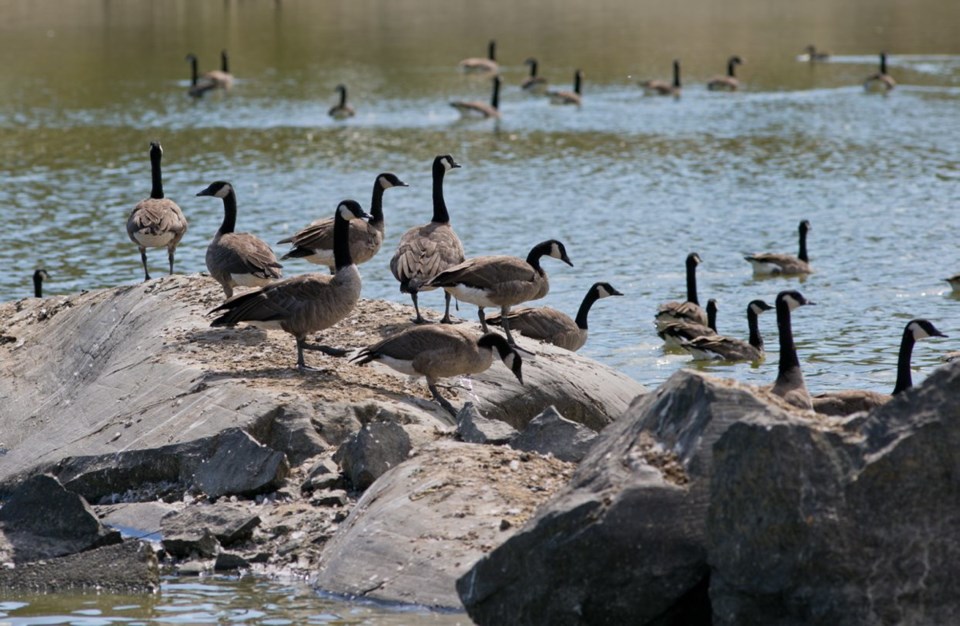A dozen activists and two dogs stood on a Galloping Goose pedestrian bridge during rush hour traffic Monday with signs decrying the recent culling of nearly 500 Canada geese in Parksville.
“We’re hoping to get a few honks,” said organizer Jordan Reichert. Pun intended. Reichert is the Victoria representative from the Animal Alliance Environment Voters political party. He ran in the last federal election — “Mostly to raise awareness,” he said — but he did get a few hundred votes.
The Parksville cull is just the latest in a “war on wildlife in B.C,” Reichert said. “We kill deer, geese, wolves, yet science says killing is not the way to mitigate living with animals.”
On June 26, Parksville rounded up 484 Canada geese doing damage to a local estuary and killed them. Reichert said the town did not do its due diligence in researching non-kill methods of controlling geese or consulting the public.
“We have a whole manual with case studies on this issue. There are lots of non-lethal methods available,” he said, citing habitat modification as one. Reichert said the protest was to make the public aware and let them decide on the issue.
“We have a choice. Why is it OK to love cats and dogs but kill geese and eat pigs? We pick and choose which animals to extend our morals to. It’s something to think about,” he said.
Parksville Mayor Marc Lefebvre said the decision to cull the geese was taken seriously with the aid of experts.
He said the city consulted local biologists and the guardians of the estuary where the non-migratory birds stay.
“This is after several years of addling eggs. We’ve tried raptors and dogs. The population kept growing,” said Lefebvre. “The experts came to one conclusion: It was a health and safety concern.”
Lefebvre said Parksville was spending $25,000 to $35,000 a year on a “pooper scooper for our soccer fields” and there was worry goose feces could bring E. coli to the local beaches.
The cull addressed the overpopulation of the geese, estimated to be 500, and cost about $40,000.
Lefebvre said a local First Nation was invited to harvest the culled geese for meat. He said he hopes they don’t have to do it again anytime soon.
“We’re monitoring the situation,” he said.
The Capital Regional District has shifted tactics to deal with Canada geese damaging farms and fields after a cull in 2015. In that instance, the CRD had a permit to cull 250 geese but only managed to locate and kill 43 at a cost of $31,200 — or $725 each. Predicting the location of the birds is also a problem for addling eggs, which the CRD has also done in the past.
Mike Hicks, who represents the Juan de Fuca area and is working on the goose-management issue, said he spent the better part of last year visiting council meetings pitching a new plan, “to amend bylaws to allow the hunting of geese [for food] by anyone who already has a crop damage permit,” said Hicks, who spoke to councils in Saanich, Central Saanich, North Saanich, Metchosin and Sooke.
This would mean farmers who already have a federal permit to cull five geese per week could hunt up to 10 geese for food in hunting season and appoint other hunters to do the same on their property.
Hicks said this could reduce the local Canada geese population by 2,000. He said it is currently at about 6,000 and there are estimates of growth to 60,000 over the next two decades.
“This will reduce the overall number of geese and help farmers help themselves instead of watching their crops be devastated,” said Hicks, adding a hunt also brings more local food to tables. “We’re expecting the municipalities to pass this come hunting season [in September].”



